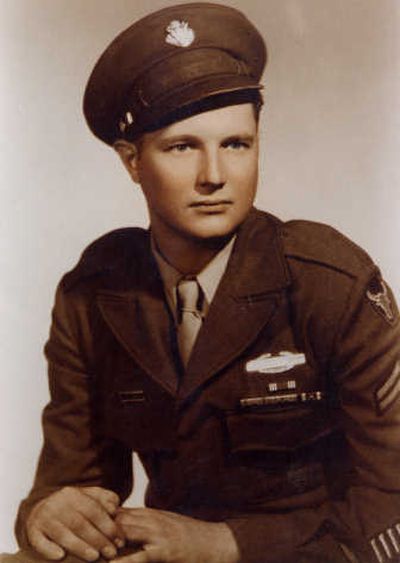Wesley Tate taught what he knew: strength, independence

One of the hardest times in Wesley Tate’s life was staying alive while helping carry a fellow prisoner of war during the Bataan Death March in the Philippines during World War II. Given scant food and water, thousands were killed or died along the long march that covered more than 60 miles.
But Tate, a tough outdoorsman from Montana, was a man of great inner fortitude and resilience, character traits his family says he displayed throughout his life and depended on during that gruesome march and the following 3 ½ years as a POW.
A veteran of three wars who served in the military a cumulative 27 years, Tate eventually settled in Spokane Valley where he owned and operated Mountain View Honey Farm with his brother-in-law and later, Tate’s Honey Farm, which is still in the family.
Tate died June 28 at the age of 85, after raising four children with his wife, Emma, all of whom attended West Valley High School. Three grandchildren also graduated from West Valley and all of his school-age great-grandchildren are in the district.
It is a family with a legacy of independence and hard work instilled in them by Tate, who never complained about his war experiences and only talked about them in his later years.
“He had nothing bad to say about internment other than it was rough,” said his son, Jerry Tate.
As a prisoner of war in northern Japan, Tate used survival skills he learned as a boy in Montana, sneaking outside the wire of the prison camp to forage for food. He stole the soy cake feed from a nearby cattle yard or used gambling winnings to buy food and quinine, an antimalaria medicine, in a nearby village, which he shared back inside the prison camp.
“Dad could take care of himself,” said Jerry, describing his dad as independent and self-reliant, characteristics he developed in early childhood. Tate was 5 months old when his mom died in a house fire. He was farmed out to other families until his dad, a traveling minister, remarried several years later.
The hardship of those early years helped develop his strength and fortitude, characteristics he encouraged and instilled in his own children and grandchildren, and depended upon during the war.
Tate had enlisted in 1941 at the age of 18 and a sturdy 225 pounds, but by the time he was freed in 1946, he had dropped to a mere 135 pounds.
After the war he moved to Phoenix, working as a beekeeper while attending college. Bees were an old love from his teenage years when he worked for a beekeeper in Fairmont. But in Phoenix he soon met a new love, his bride, Emma, whom he called Amy. They married in October 1946 and were together 40 years before Emma died of breast cancer in 1986.
Within a few years Tate was eager to return to military service, joining the Marine Corps as a reservist in 1950 because, at that time, it was the only branch that would take a married man. A few months later his unit was sent to Korea with the 1st Marine Division.
In Korea he fought in the first wave of Gen. Douglas MacArthur’s famous amphibious landing at Inchon as well as the Battle of Chosin Reservoir, becoming one of the “Frozen Chosin.” It was so cold in Korea that winter he learned to dig foxholes with dynamite.
After returning from Korea, Tate transferred to the Air Force, serving until he retired from the service in 1971 and fighting in Vietnam, his third and final war.
“He fought in all those wars, but never regretted it,” said his son, Jerry.
“He taught us the military way of life,” said his granddaughter, Jennifer Tate, describing how he taught them the value of hard work, respect and owning your actions.
He also taught them the value of family.
As a youth in Montana, Tate helped his dad build a log cabin near Big Timber, where he learned to hunt and fly fish. It was his wish that his ashes be scattered at that cabin, which is still in the family, a place of good memories with his dad, his children and his grandchildren.
Jerry Tate remembers following his dad fly fishing, watching him cast and then mimicking his movements because his dad said he would learn by example. It took the entire summer before Jerry finally caught a fish. But that was Tate’s way; he built the confidence of his children, and later his grandchildren, by giving them the opportunity to learn through experience and find their own independence and strength, just as he found his.